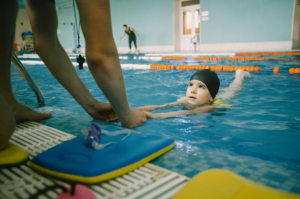Swimming is not just a fun activity; it’s a crucial life skill. For children, learning to swim can boost their confidence and ensure their safety around water. Choosing the right swimming instructor is vital to your child’s successful learning. This guide will help you understand what to look for in a swimming instructor and how to make the best choice for your child.
Understanding Your Child’s Needs
Understanding your child’s specific needs is the first step in finding the perfect swimming instructor. Every child is unique, and their needs vary when it comes to learning how to swim. Age-appropriate swim lessons are essential. Young children may need more play-based learning, while older children might benefit from structured lessons. Knowing your child’s learning style can make a significant difference in their progress.
Children with disabilities or special requirements need instructors who are trained to meet their specific needs. Look for programs that offer swimming classes for varying abilities or specialized classes and instructors with experience in adaptive swimming. These tailored lessons can help your child feel included and capable.
Understanding these needs also involves observing how your child responds to different teaching styles. Some children thrive under gentle guidance, while others need a more structured approach. Knowing what works best will help you choose the right instructor.
Qualities to Look for in a Swimming Instructor
When searching for a swimming instructor, prioritize certification and experience. A certified instructor has completed the necessary training and understands safe teaching practices. Experience, particularly with children of similar ages and abilities, is crucial. Instructors who have worked with diverse skill levels can provide effective teaching methods tailored to your child’s unique needs.
Patience is another vital quality to seek in a swimming instructor. Teaching children can be challenging, and a patient instructor will create a supportive environment that encourages learning at a comfortable pace. Look for someone who can remain calm and understanding, especially when progress is slower than expected. This patience fosters a positive experience that builds your child’s confidence in the water.
Finally, assess the instructor’s ability to communicate. A good instructor should provide clear explanations and positive reinforcement. Observing how they give feedback during a lesson can give you insight into their teaching style. A great instructor will engage your child, using encouraging language to instill a love for swimming while ensuring they feel safe and secure throughout the learning process.
Researching Local Swim Programs
Start by researching local swim schools and their offerings. Look for programs with positive reviews and a track record of success. Many schools offer trial lessons or open days where you can observe the class environment.
Assess the quality of a swim program by visiting the facility. Check for cleanliness, the condition of the pool, and the professionalism of the staff. Speak with other parents to get their opinions on the program’s effectiveness and the instructors’ capabilities.
Another good indicator of a quality program is the variety of class options available. Programs that offer different levels and types of classes can accommodate your child’s changing needs as they progress.
Preparing for the First Lesson
The first swim lesson can be both exciting and nerve-wracking for a child. Prepare your child by explaining what to expect. Talk about the pool, the instructor, and the fun activities they will do. This can help ease any anxiety they may have.
Physically preparing your child is also important. Ensure they have the right swim gear, including a comfortable swimsuit, goggles, and a swim cap. Arrive early to give your child time to acclimate to the new environment.
Emotionally preparing your child involves positive reinforcement. Encourage them and express your confidence in their abilities. Remind them that it’s okay to make mistakes and that the instructor is there to help them learn.
The Importance of Ongoing Communication
Ongoing communication with the swimming instructor is key to your child’s success. Regular feedback helps identify areas for improvement and allows you to share any concerns or observations about your child’s progress.
Building a positive relationship with the instructor fosters a supportive learning environment. Be open and approachable, and encourage your child to express their feelings about the lessons. This collaboration can lead to a more tailored and effective learning experience.
Communication also includes staying informed about any changes in the program or schedule. Being proactive and engaged in your child’s swimming education shows your commitment and can inspire your child to stay motivated.

Choosing the right swimming instructor for your child involves understanding their needs, researching local programs, and ensuring ongoing communication. The right instructor can make a significant difference in your child’s swimming journey, turning it into a positive and rewarding experience.
Take the first step today by exploring local swim programs and talking to potential instructors. Your involvement and support can help your child develop essential swimming skills and a lifelong love for the water.



